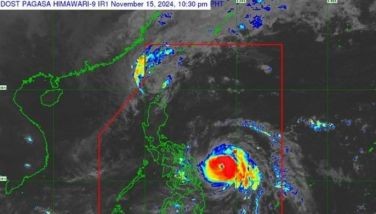Biazon files bill to define grounds for impeachment
MANILA, Philippines - A senior administration lawmaker has filed a bill to define grounds for impeachment, in what could be the legislative remedy to expedite the resolution of impeachment cases in the future.
Muntinlupa City Rep. Rodolfo Biazon filed House Bill 5969, also known as the Impeachment Act of 2012, to define the grounds for impeachment as provided for in the 1987 Constitution.
The measure has been referred to the committee on justice.
Biazon was among the House leaders who did not sign the impeachment complaint against Chief Justice Renato Corona last Dec. 12.
It was not yet clear how the measure, if enacted into law, would affect the possible filing of another impeachment complaint against the country’s top magistrate this year in the event that he is not removed from his post.
“The endless arguments involving technicalities in the on-going impeachment trial of Chief Justice Renato Corona opened Congress to negative public perceptions, adversely affecting its integrity and credibility in the performance of its constitutional mandate,” Biazon said.
He said the country has had only three instances of impeachment cases involving three presidents – Elpidio Quirino, Diosdado Macapagal and Ferdinand Marcos.
“However, partisan politics and political inclinations and preferences precluded the completion of the process, thereby depriving the country of the legal precedents that could have served as the touchstones and bedrock of future proceedings of this nature,” Biazon said.
He said the public has become privy to “the sad spectacle of the parties to the impeachment process engaged in seemingly endless arguments involving questionable complaints, the rights of a public official subject to the impeachment, the quantum of evidence required for conviction, and most importantly, the meaning and coverage of some of the grounds for impeachment.”
“These matters could have been easily and expeditiously resolved had it not been due to the dearth in legal precedents and the lack of implementing clarificatory laws,” the lawmaker said.
Under the bill, culpable violation of the Constitution means any willful, voluntary, intentional and/or felonious act or any act committed in bad faith by an impeachable public official in violation of his oath of office and the 1987 Constitution.
Treason refers to any act by an impeachable public official of levying war against the Philippines or adheres to her enemies by giving them aid and comfort. It shall include acts of conspiracy and proposal to commit treason.
This term and its essential elements shall conform to the provisions of Republic Act 3815, otherwise known as the Revised Penal Code of the Philippines, as amended.
Bribery means the giving, offering or accepting of a thing of value as an inducement to do or refrain from doing something required by a law or regulation. The act and its essential requisites shall be governed by the provisions of RA 3815, as amended, and other related laws and regulations on the subject.
Graft and corruption refers to any act of an impeachable public official for private or personal gain that involves the use and/or an abuse of the powers and authority of his public office, which is offensive to public sensibility.
This act shall be governed by the provisions of RA 3019, otherwise known as the Anti-Graft and Corrupt Practices Act, as amended, and other related laws and regulations on the subject.
Other high crimes refer to acts of gross misconduct and/or the offensive use by an impeachable public official of the powers and authority reposed upon him/her by the sovereign people that strikes at the very marrow of governmental systems as inscribed in the 1987 Constitution and its implementing issuances.
Betrayal of public trust covers acts which may not, under certain conditions, be in violation of laws, but are nonetheless of such nature as to adversely affect the very core of the integrity and reliability of an impeachable public official that would render him/her unfit to hold office in violation of the trust reposed upon him/her by the sovereign people.
It shall include acts of malfeasance, misfeasance, nonfeasance or any act unbefitting and not expected of an impeachable public official.
- Latest
- Trending


























